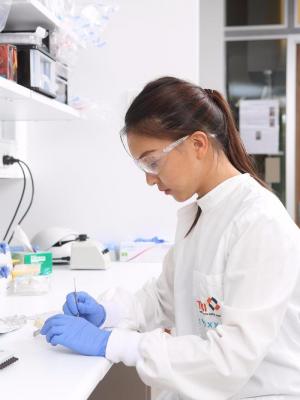Paula Kuo, PhD candidate
I can now see my potential of working in the biomedical industry and have enough confidence to say that I could do it well.
In recent months I’ve been committing three days a week to an Industry Experience Placement at Vaxxas while I work towards my PhD.
I was looking for future employment possibilities outside of academic research but wanted to still be involved in research and development. I want to see research results in real life, with a translational research application.
Our lab used to have joint meetings with the other labs and that’s how I became aware of Vaxxas and what they do. My supervisor Professor Ian Fraser kindly introduced me to the Vaxxas Chief Development Officer, and set up the opportunity for me to propose a placement there with the assistance of the Graduate School to facilitate it.
This career development opportunity is giving me a chance to familiarise with and contribute to a range of areas of the business. The placement has given me the chance to do things outside of my current research area as I rotate through different work groups in the Vaxxas team, e.g. Quality Assurance, which I have no experience in and probably wouldn’t have experienced without this.
I can now see clear differences between academic research and industry. In academic research, the degree of freedom to do any testing experiment or a small experiment to test a simple hypothesis is wide and it’s more of a one-person operation. In an industry environment, everything requires team work. Different teams are involved in planning and carrying out a project together. The final aim and output are very different as well. In academic research, you go into detailed mechanisms of small questions, so it’s more about the depth of the whole project. Whereas in industry, the goal is to achieve higher efficiency and focus on the end product, so the company and the investors can profit.
The most challenging part I found initiating a placement (for biomedical or science related PhD student like me) is that there’s a critical judgement to make of whether to choose to have the experience at some cost to your milestone deadlines and workload, or to explore different experiences. If you have managed your time well at the beginning of the PhD, and have the opportunity to take on a placement, then definitely try.
I greatly appreciate the help of my supervisor who thinks that this is an important aspect of a PhD student, to get involved in how academic discoveries and experiences can translate into clinical developments, as well as knowing the difference between academic research and industry.

